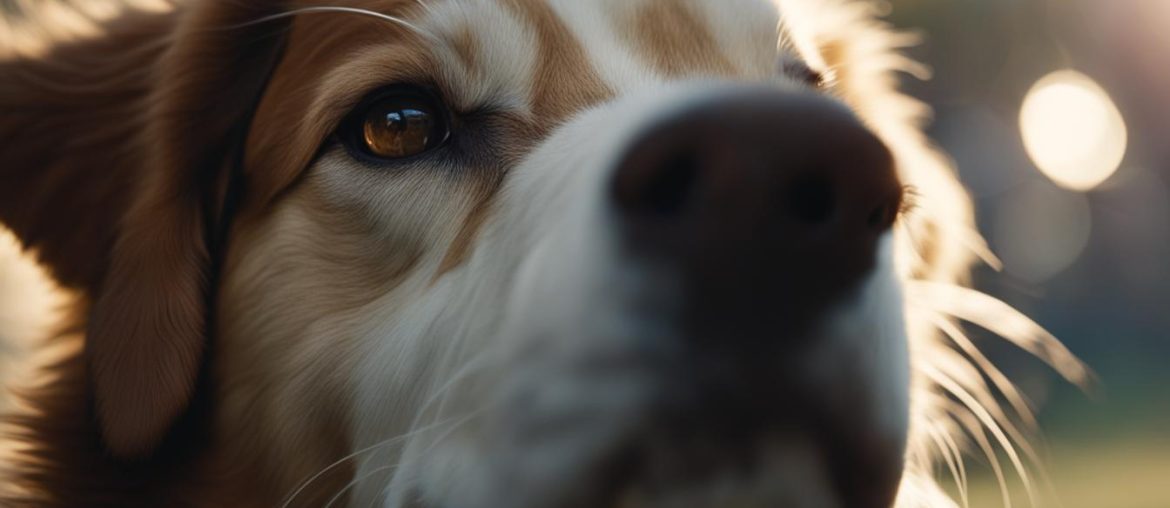Can dogs have cloves? Are cloves safe for dogs? Can dogs eat cloves? These are common questions that pet owners may have when it comes to giving their furry friends a taste of various spices. In this guide, I will discuss the potential risks of dogs consuming cloves and why it’s best to avoid this particular spice when it comes to your dog’s diet and overall well-being.
Key Takeaways:
- Cloves are not safe for dogs to consume due to the compound eugenol, which can cause liver toxicity.
- Avoid giving your dog anything containing cloves or clove oil to ensure their safety and well-being.
- If your dog has consumed a significant amount of cloves, seek immediate veterinary care.
- Consider alternative treats for dogs, such as peanut butter, apples, blueberries, and carrots.
- Consult with your holistic veterinarian before introducing any herbs or spices to your dog’s diet.
The Dangers of Clove Consumption for Dogs
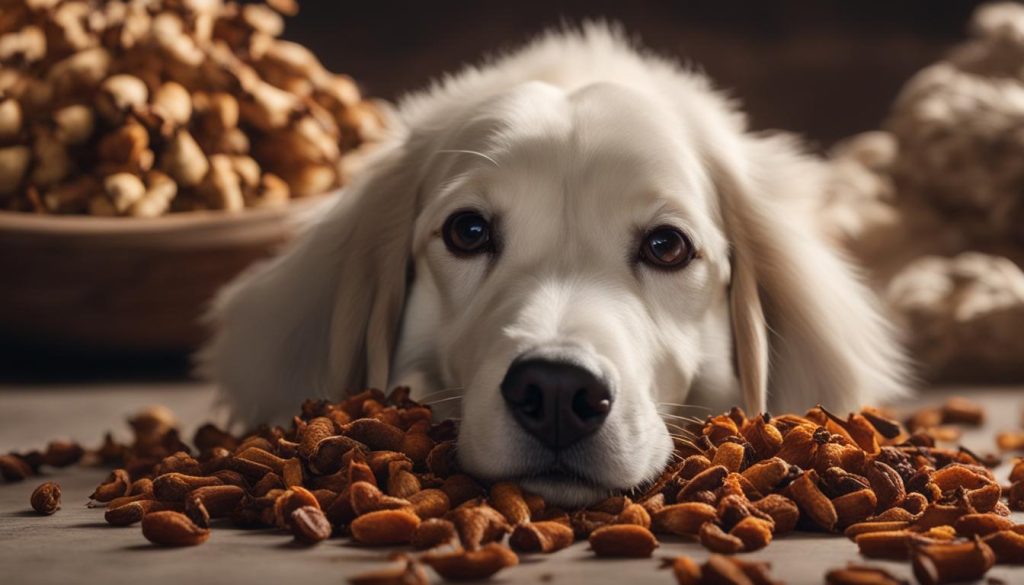
When it comes to feeding our furry friends, it’s important to be aware of what foods are safe for them and what can potentially harm them. While cloves may be a common spice in our kitchens, they can pose serious health risks to dogs. The compound eugenol found in cloves can cause liver toxicity in cats and potentially in dogs as well. Although dogs don’t have the same enzyme deficiency as cats, they are still at risk of developing health problems if exposed to high amounts of cloves and clove oil. Therefore, it is crucial to understand the dangers of clove consumption for dogs and take steps to keep them safe.
Ingesting large amounts of cloves or clove oil can be life-threatening for dogs. Although there is no exact data on the quantity of eugenol that becomes harmful to dogs, it is best to err on the side of caution and avoid giving your dog anything containing cloves. Due to the potential risks, it is important to keep cloves and clove oil out of your dog’s reach. This includes being mindful of any products or treats that may contain cloves as an ingredient. By being proactive and vigilant, you can help protect your furry friend from the dangers of clove consumption.
To better understand the risks, it’s crucial to consult with your veterinarian. They can provide guidance on what is safe and what to avoid when it comes to your dog’s diet. When seeking advice, be sure to mention any potential exposure to cloves or clove oil. In case of accidental ingestion, it is best to seek immediate veterinary care. The sooner your dog receives proper treatment, the better the chances of a positive outcome.
| Dangers of Clove Consumption for Dogs: |
|---|
| Health risks of cloves for dogs |
| Can cloves be toxic to dogs |
| Risks of dogs eating cloves |
Key Takeaways
“Clove consumption can pose serious health risks to dogs due to the compound eugenol, which can cause liver toxicity.”
- Cloves contain eugenol, which can be harmful to dogs.
- Ingesting large amounts of cloves or clove oil can be life-threatening for dogs.
- Consult with a veterinarian for guidance on your dog’s diet and potential exposure to cloves.
- Seek immediate veterinary care if your dog ingests cloves or shows symptoms of poisoning.
Keeping our beloved pets safe and healthy should be a top priority. By being aware of the dangers of clove consumption for dogs and taking necessary precautions, we can help ensure that our furry friends are protected from potential harm.
Clove Oil Toxicity and Its Effects on Dogs
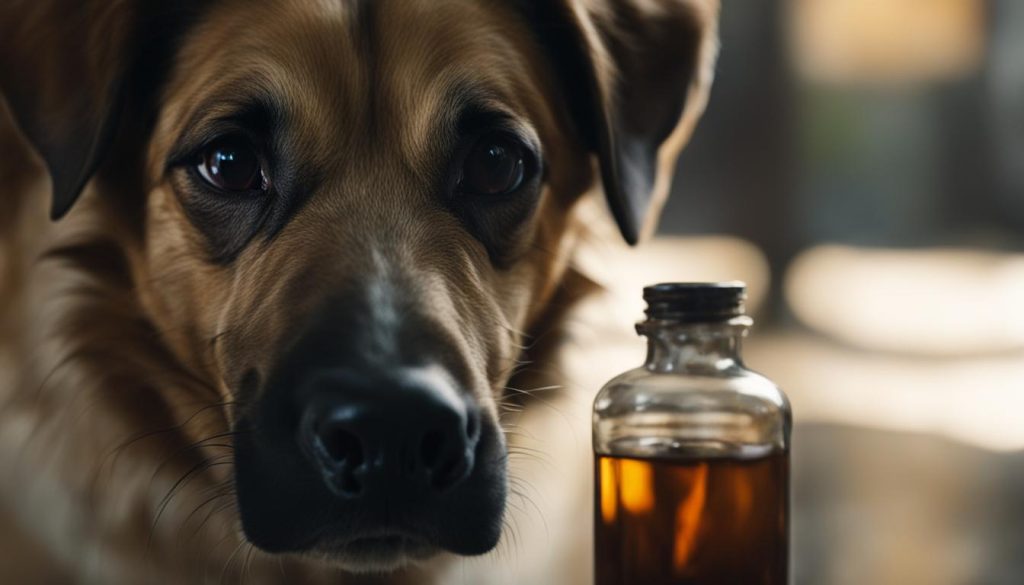
Clove oil, which contains the compound eugenol, can be highly toxic to dogs if administered incorrectly or in excessive amounts. It is important for dog owners to understand the risks associated with clove oil and take necessary precautions to keep their pets safe.
The primary danger of clove oil for dogs lies in its ability to cause severe irritation to the skin and mucous membranes. Dogs may develop symptoms such as redness, swelling, and itching if exposed to clove oil directly or if it comes into contact with their fur or skin. Ingesting clove oil can also lead to gastrointestinal distress, including vomiting and diarrhea.
Furthermore, clove oil can interfere with the enzymes responsible for the proper functioning of the liver. Prolonged or excessive exposure to clove oil can potentially lead to liver damage or even liver failure in dogs. Therefore, it is crucial to keep all forms of clove oil out of your dog’s reach and avoid using it on or around your pet.
| Signs of Clove Oil Toxicity in Dogs | Actions to Take |
|---|---|
| Skin redness, swelling, and itching | Contact your veterinarian for guidance and advice |
| Gastrointestinal distress, including vomiting and diarrhea | Seek immediate veterinary care |
| Lethargy and weakness | Call the Pet Poison Helpline or consult with your veterinarian |
If your dog has been exposed to clove oil or is experiencing any symptoms of toxicity, it is essential to seek veterinary advice as soon as possible. Your vet will be able to assess the severity of the situation and provide appropriate treatment to ensure your dog’s well-being.
Safe Spices for Dogs
While cloves are not safe for dogs, there are some spices that can be beneficial to their health in moderation. Here are a few spices and herbs that are considered safe for dogs:
- Ginger: Ginger is known for its anti-nausea properties and can be helpful for dogs with motion sickness or an upset stomach.
- Turmeric: Turmeric contains the active compound curcumin, which has anti-inflammatory properties and may provide various health benefits for dogs, such as aiding in joint health and digestion.
It is important to note that even though these spices are considered safe for dogs, moderation is key. Always consult with your holistic veterinarian before introducing any herbs or spices to your dog’s diet to ensure it is suitable for their specific needs.
Ginger
Ginger is a safe and beneficial spice for dogs when used in moderation. It is known for its anti-nausea properties and can be helpful for dogs with motion sickness or an upset stomach. Ginger can help soothe the digestive system and reduce feelings of nausea, making it a great natural remedy for dogs experiencing digestive issues.
When feeding ginger to your dog, it is important to use it in small amounts. You can grate fresh ginger and mix it into your dog’s food or give them ginger treats made specifically for dogs. However, always consult with your veterinarian before introducing any new foods or supplements to your dog’s diet.
Turmeric
Turmeric is another spice that is considered safe for dogs when used in moderation. It contains the active compound curcumin, which has anti-inflammatory properties and may provide various health benefits for dogs. Turmeric can help support joint health, aid in digestion, and even provide antioxidant properties.
You can incorporate turmeric into your dog’s diet by adding a small amount of turmeric powder to their food. However, it is important to note that turmeric should be used sparingly and should not be given in excessive amounts. As with any new addition to your dog’s diet, consult with your veterinarian to ensure it is safe and appropriate for your dog.
| Spice | Health Benefits |
|---|---|
| Ginger | Anti-nausea properties, aids digestion |
| Turmeric | Anti-inflammatory, supports joint health and digestion |
Unsafe Spices for Dogs
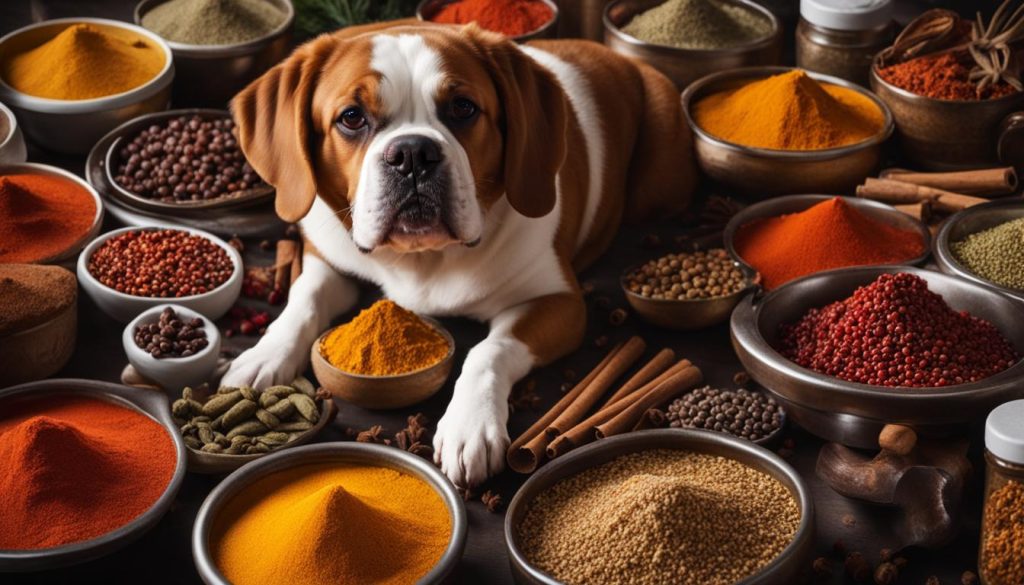
While cloves are not safe for dogs, there are several other spices that should also be avoided in a dog’s diet. Nutmeg is one such spice that can be toxic to dogs if ingested in large quantities. It contains a compound called myristicin, which can cause symptoms like hallucinations, tremors, and seizures in dogs. It is important to keep all products containing nutmeg, such as baked goods and holiday treats, out of your dog’s reach to prevent accidental ingestion.
Allspice is another spice that should be avoided in a dog’s diet. It contains eugenol, the same toxic compound found in cloves, which can be harmful to dogs in high amounts. Allspice is commonly used in certain cuisines and can be found in various dishes and seasonings. Make sure to read ingredient labels carefully and avoid giving your dog anything that contains allspice.
Paprika is yet another spice that can cause problems for dogs, particularly in large quantities. While a small amount of paprika is unlikely to cause any issues, excessive consumption can irritate a dog’s digestive system and lead to gastrointestinal distress. Avoid giving your dog foods or treats that contain paprika as an ingredient, and be cautious when using spices that may be seasoned with paprika.
Table: Unsafe Spices for Dogs
| Spice | Toxic Component | Potential Risks |
|---|---|---|
| Nutmeg | Myristicin | Hallucinations, tremors, seizures |
| Allspice | Eugenol | Liver toxicity, digestive upset |
| Paprika | Various compounds | Gastrointestinal distress |
It is crucial to prioritize the safety and well-being of your canine companion by avoiding the use of these spices in their diet. If you suspect that your dog has consumed any of these unsafe spices, it is recommended to seek immediate veterinary advice to ensure appropriate care and treatment.
Alternative Treats for Dogs
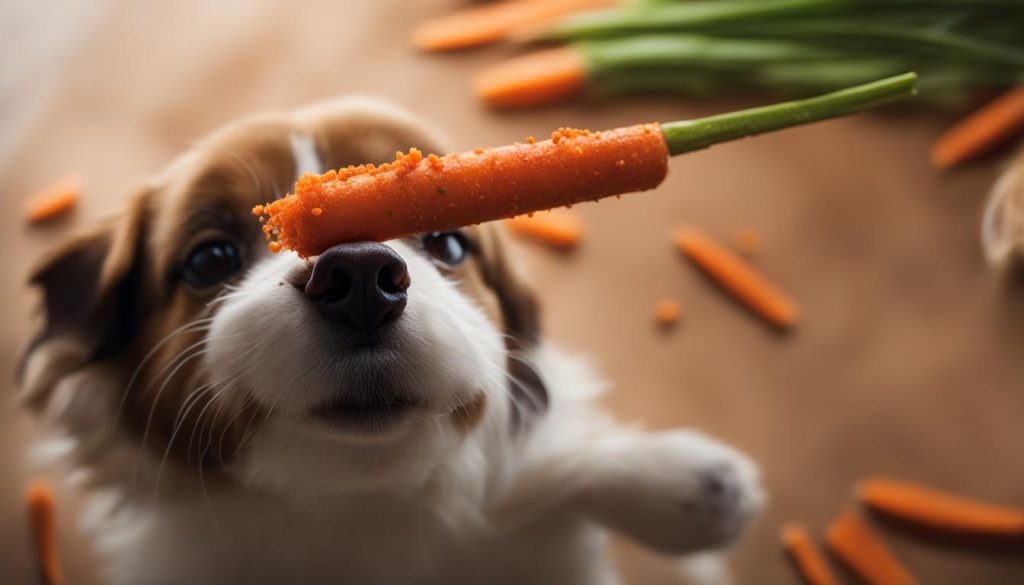
If you’re looking to reward your dog with a treat, there are plenty of healthier and safer options than cloves. Here are some alternatives to consider:
- Peanut Butter: Many dogs love the taste of peanut butter. Opt for natural peanut butter without added sugars or xylitol, as these can be harmful to dogs. Peanut butter can be used as a stuffing for interactive toys or as a tasty treat on its own.
- Apples: Apples are a safe and nutritious fruit for dogs. They can be given as slices or pureed and frozen for a refreshing snack. Be sure to remove the core and seeds, as they can be choking hazards.
- Blueberries: These tiny berries are packed with antioxidants and are low in calories, making them a great treat option for dogs. Serve them fresh or frozen as a tasty and healthy snack.
- Carrots: Crunchy and full of vitamins, carrots are a great alternative to cloves. They can be served raw as a satisfying chew or cooked as a tasty addition to your dog’s meal.
Remember to introduce any new treats gradually and in moderation, as individual dogs may have different tolerances and sensitivities. Always consult with your veterinarian before making any significant changes to your dog’s diet.
What To Do if Your Dog Consumes Cloves
If you suspect that your dog has consumed a significant amount of cloves, it is important to seek immediate veterinary care. Your vet will be able to assess the severity of the toxicity and provide the necessary treatment. It is also recommended to contact the Pet Poison Helpline for proper advice regarding essential oil exposure. When contacting the helpline or providing information to your vet, try to provide an accurate description of the quantity of cloves ingested to help assess the risk to your dog.
Immediate action is crucial when your dog consumes cloves. Contact your veterinarian or an emergency animal hospital right away. Time is of the essence, as the sooner your dog receives medical attention, the better their chances of a full recovery. While awaiting professional guidance, do not attempt to induce vomiting or administer any home remedies without veterinary approval. Incorrect treatment measures can potentially worsen the situation, so it is essential to follow the guidance of a veterinary professional.
While waiting for veterinary care, closely monitor your dog for any symptoms or changes in behavior. Common signs of clove ingestion in dogs can include vomiting, diarrhea, abdominal pain, excessive drooling, tremors, seizures, or jaundice. Take note of any unusual behaviors or symptoms and relay this information to your veterinarian. The more information you can provide, the better equipped they will be to provide appropriate treatment.
Table: Signs of Clove Ingestion in Dogs
| Signs of Clove Ingestion in Dogs | Description |
|---|---|
| Vomiting | Expelling the contents of the stomach through the mouth |
| Diarrhea | Loose or watery bowel movements |
| Abdominal pain | Discomfort or tenderness in the abdominal area |
| Excessive drooling | Production of an excessive amount of saliva |
| Tremors | Involuntary shaking or trembling |
| Seizures | Uncontrolled, abnormal electrical activity in the brain |
| Jaundice | Yellowing of the skin and eyes due to liver damage |
Remember, prevention is always better than cure. Keep cloves and clove oil out of your dog’s reach to avoid accidental ingestion. It is essential to educate yourself about potential hazards and ensure a safe environment for your furry friend. By being proactive and taking appropriate measures, you can protect your dog from the dangers of clove ingestion and promote their overall well-being.
Wrapping Up
To summarize, it is important to prioritize the safety and well-being of our furry companions. While cloves are safe for human consumption, they can be harmful to dogs. The compound eugenol found in cloves can cause liver toxicity in cats and potentially in dogs as well. It is best to avoid giving your dog anything containing cloves to prevent any health problems.
However, there are safe spices that can be beneficial to your dog’s health when used in moderation. Ginger is known for its anti-nausea properties and can be helpful for dogs with motion sickness or an upset stomach. Turmeric, with its anti-inflammatory properties, may provide various health benefits for dogs. It is always recommended to consult with your holistic veterinarian before introducing any herbs or spices to your dog’s diet.
Remember, the safety of your dog should be a top priority. Providing alternative treats such as peanut butter popsicles made with natural peanut butter and mashed banana, seedless apples, blueberries, or carrots can be a safe and nutritious way to reward your canine companion. By avoiding cloves and selecting safe spices and treats, you can ensure the well-being of your beloved pet.
FAQ
Can dogs have cloves?
No, cloves are not safe for dogs to consume.
Are cloves safe for dogs?
No, cloves can be harmful to dogs if ingested in high amounts.
Can dogs eat cloves?
It is best to avoid giving your dog cloves to ensure their safety and well-being.
What are the potential risks of dogs consuming cloves?
Cloves contain a compound called eugenol, which can cause liver toxicity in cats. While dogs don’t have the same enzyme deficiency as cats, they are still at risk of developing health problems if exposed to high amounts of cloves and clove oil.
What are the health risks of cloves for dogs?
Clove consumption can pose serious health risks to dogs, including liver toxicity.
Can cloves be toxic to dogs?
Yes, cloves can be toxic to dogs if ingested in large amounts or if exposed to clove oil.
Can dogs be exposed to clove oil?
Clove oil, which contains eugenol, is not recommended for use on or around dogs. Essential oils, including clove oil, can be toxic to dogs if administered incorrectly or in the wrong dosage.
What are the risks of dogs ingesting clove oil?
Clove oil can cause severe irritation to the skin and mucous membranes in dogs. It can also interfere with the enzymes responsible for the proper functioning of the liver.
What are some safe spices for dogs?
Ginger and turmeric, when used in moderation, can be safe and beneficial for dogs.
Can dogs eat ginger or turmeric?
Yes, ginger and turmeric can be added to a dog’s diet in moderation after consulting with a holistic veterinarian.
What are the spices to avoid giving dogs?
Nutmeg, allspice, and paprika should be avoided as they can be harmful to dogs.
Can dogs eat nutmeg or paprika?
No, nutmeg and paprika can be toxic to dogs and cause various health issues.
What are the dangers of allspice for dogs?
Allspice contains eugenol, the same toxic compound found in cloves, and can be harmful to dogs if ingested in high amounts.
What are some alternative treats for dogs?
Peanut butter popsicles, seedless apples, blueberries, and carrots are safe and nutritious alternatives to cloves for treating dogs.
Can dogs eat peanut butter or apples?
Yes, peanut butter and seedless apples can be given to dogs as treats in moderation.
What fruits and vegetables are safe for dogs?
Blueberries and carrots can be given to dogs in moderation as they provide nutritional benefits and are safe for consumption.
What should I do if my dog consumes cloves?
If you suspect that your dog has consumed a significant amount of cloves, it is important to seek immediate veterinary care. Contact the Pet Poison Helpline for proper advice regarding essential oil exposure.
What actions should I take if my dog ingests cloves?
Contact your veterinarian for assessment and treatment. Provide accurate information about the quantity of cloves ingested to help determine the risk to your dog.
Can dogs have cloves?
No, cloves are not safe for dogs to consume. It is best to avoid giving your dog cloves to ensure their safety and well-being.


